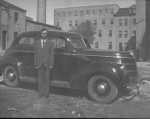Page
1 | Page 2 | Page
3 | Page 4 | Page
5 | Page 6
Not
all the conscientious objectors were interested in forestry work.
Many felt that they had the ability to be of service elsewhere.
Doing forestry, agricultural, and industrial work during the war
was necessary, and many COs enjoyed this service. Others, however,
felt that their usefulness lay elsewhere. A number of COs volunteered
for hospital service.
Hospital
service may seem out of place when compared to the other jobs COs
performed, but it was also of national importance. Also, since COs
working in a hospital had to interact with patients and staff on
a daily basis, it was a good opportunity to give a Christian witness.
This
is one of the reasons Jake Reimer liked working in a hospital.
“In
the mental hospital the work was interesting and challenging.
Here we did not have to talk about our Christianity, but rather
live it, and people respond far quicker to action than words.”
[MHC, 1015-43]
Surrounded
by like-minded COs in a forestry camp, there were fewer opportunities
to be a Christian example to non-believers. In the hospital, Jake
asserted, “we could live our Christianity” in another way.
The
hospital experience was a powerful one for COs. Years later, some
still remember details about their arrival and their daily routine.
Henry H. Funk served at the Hospital for Mentally Defectives in
Portage la Prairie, Manitoba. His first experience with the hospital
and its patients speaks for many COs.
“Once
I came near the building and they could see me they turned their
full attention and scrutiny on me – with appropriate and loud
commentary. My arrival afforded them a bit of diversion from their
otherwise extremely monotonous existence and they made the most
of it. Later I would learn to know some of them personally and
to like them as individuals and as persons. At the moment, however,
I was plain scared. Society had a lot of prejudiced notions about
the mentally ill and I shared those notions. They sounded strange
and acted strange and looked strange and they were part of my
yet very strange future.”
The
hospital was large.
“There
were about 700 patients at Portage. The female wards were taken
care of by ladies and the male wards by men. While I began in
the nursery, eventually we got to work on most of the male wards
and on various shifts. Also there were outside jobs on the grounds
and gardens, working with small groups of male patients. The work
the patients did was mostly in the line of occupational care.
They were not worked hard.”
 |
 |
| COs working at a hospital |
Young CO in front of a hospital |
Although
their supervisors and co-workers were initially suspicious, Henry
writes that the COs soon earned respect and trust.
“Relationships
at work were positive – both among COs and with others with whom
we worked. We worked five days a week and our two days off were
usually together. Once we were familiar with the routine on the
various wards it was easy to trade shifts and days off. That way
we could line up four or even six consecutive days off with which
to go home on leave. Mr. Inglis [the medical superintendent] was
very lenient with us about this. He said that he knew one of us
would be on duty in each place even if he did not always know
who. Soon we started trading with the regular staff too and soon
they started helping each other out as well. This never used to
happen before, they said.” [ASM, 138-153]
Page
1 | Page 2 | Page
3 | Page 4 | Page
5 | Page 6
|


